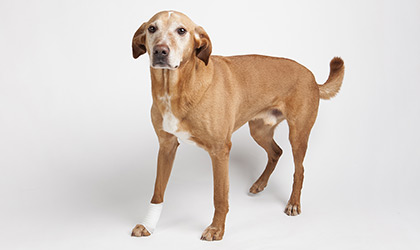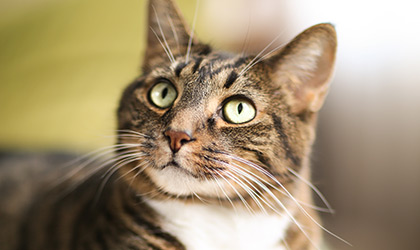
As with humans, vaccinations can protect cats from the perils of infectious diseases – conditions that often have wretched, painful, and even fatal ends. The benefits of getting your kitty vaccinated extend beyond protecting her individual needs; widespread vaccination can actually safeguard the entire feline population in the UK. When a high percentage of cats in any given area are vaccinated, the protection is called ‘herd immunity’, which limits the rate at which serious disease outbreaks can spread. Thanks to such advancements in veterinary science, owners can now equip their bundles of feline joy with the immunity needed to live happy and healthy lives. Here’s everything you need to know about vaccinating your four-pawed friend.
What is a vaccine and how do they work?
Vaccines contain small amounts of dead or altered viruses, rendering them safe for your kitty. They stimulate your furry friend’s immune system to create disease-fighting cells and antibodies (a.k.a. circulating proteins) to combat invading diseases.
Why should I vaccinate my kitten?
As owners, you have a moral and legal obligation to safeguard the pets in your care. It’s your sole responsibility to protect them against disease, suffering and pain. Preventative steps, like vaccination programmes, should be implemented to avoid the potentially fatal consequences of ill health. Indeed, if your cat did contract an infectious disease, the prognosis wouldn’t be bright for her. Many of these conditions are agonising, chronic and, sadly, fatal.
When does my kitten need her vaccinations?
It’s important to get your cat vaccinated around nine weeks of age, with a second dose given to her at twelve weeks. One year on, your feline friend will need a booster jab to top up her initial immunity. Regular booster jabs throughout kitty’s life will ensure she has adequate protection against all the nasty diseases (cat flu, feline leukaemia, and feline parvovirus). Your vet will advise you when your cat needs another injection.
How long are vaccinations effective for?
Although there’s divided opinion on the duration of vaccine-induced immunity, it’s generally agreed it’s not life-long. In the UK, vets recommend booster jabs for your cat to maintain healthy immune protection. And for many of the ‘core’ vaccinations, your furry friend should receive an annual booster to support her immune response.
What core vaccinations does my kitten need?
Broadly speaking, cat vaccinations can be categorised as ‘core’ and ‘non-core’. While all cats require the ‘core’ vaccinations listed below, be mindful there’s no ‘one-size-fits-all’ vaccination schedule. The ‘non-core’ vaccines are usually recommended for cats at risk of specific diseases by virtue of their geographical location, local area or lifestyle. For instance, if your cat is travelling out of the UK, she will need a rabies vaccination. Discuss your cat’s individual needs with your vet, as you may be unaware of how certain factors can affect her vaccination programme.
Feline herpes virus/feline calicivirus (a.k.a. ‘Cat Flu’)
Cat flu is an acute infection of the upper respiratory tract, triggered by two viruses – feline herpes virus (FHV-1) and feline calicivirus (FCV). These viruses are rife amongst cat communities and cause an inundation of unpleasant symptoms: sneezing, conjunctivitis, ocular and nasal discharge, mouth ulceration, coughing, inflamed throat and, rarely, skin infections and pneumonia. Though this condition usually ranges from mild to severe, it can be fatal at times. If a cat does recover, she will remain a carrier of FHV-1 or FCV, thereby acting as a source of infection for other felines. Vaccination against FCV and FHV-1 plays a major role in safeguarding against this disease, as well as reducing the severity of the condition if a cat does contract it. Disclaimer: this vaccination doesn’t always protect against cat flu since there are many strains of FCV, but this is pretty rare.
Feline infectious enteritis
Also known as ‘feline parvovirus’, this virus is often responsible for a serious bout of gastroenteritis. Typically, infected felines are struck down with severe diarrhoea and vomiting, however, the condition can also cause sudden death with no other symptoms. Worse still, this nasty virus can cause brain damage in kittens infected just before or after birth. Sadly, survival is rare. And for those who do survive, recovery can be prolonged and challenging. In recent years, vaccination against feline infectious enteritis has been tremendously fruitful and positive. Though the virus is still widespread, vaccination offers a high level of protection for cats.
Feline leukaemia virus (FeLV)
FeLV often leads to life-long, persistent infection – otherwise known as ‘persistent viraemia’, which can develop into a deadly disease. Unfortunately, if your cat does contract this condition, her fate will be sealed within three years of a diagnosis. Though FeLV can manifest in many ugly ways, most cats die from progressive anaemia, persistent infections, tumours, or leukaemia. The virus is transmitted through direct contact between cats, mainly via saliva exchange. FeLV vaccines have been highly successful over the years, protecting felines from exposure to the infection.
Do indoor cats need to be vaccinated?
Regardless of circumstance, indoor cats still need to receive vaccinations for certain infectious diseases. Although some conditions can only be caught through direct contact between cats (FeLV, for instance), others can be transmitted indirectly through shoes or clothing, meaning your cat could still be at risk despite her sheltered lifestyle.
Are vaccinations safe?
Vaccinations are the subject of continuous, rigorous research, development and refinement. You’ll be glad to hear that all vaccinations authorised in the UK have met the efficacy, safety, and quality standards as set by the independent veterinary regulator.
Do vaccinations carry harmful side effects?
Adverse reactions to vaccinations are rare and seldom severe. Ultimately, the benefits of vaccinating your cat emphatically outweigh the minor risk of any serious reaction occurring. What’s more common are minor and self-limiting responses – swelling or pain around the injection site, or short-lived nausea. But given the sole purpose of vaccination is to stimulate an immune response, such reactions are unavoidable at times.
Bottom line
When you take on a pet, you also take on a duty of care – a responsibility that extends beyond showering them with affection. As your cat’s primary safe guarder, their health and wellbeing needs to become a priority, as it would with a family member. Vaccinations offer a simple and practical way to uphold your side of the bargain. Not only do they protect your cat against diseases that could otherwise seal her fate, but they help to keep the entire feline population healthy. Fur-real, it’s one of the most conscientious actions you can take as an owner.
References:
-
Cats Protection. (2018). Vaccinations. Available online: https://www.cats.org.uk/cat-care/key-cat-care/vaccination
-
Gov.uk. (2014). Vaccines for dogs & cats; advice for owners. Available online: https://www.gov.uk/government/publications/vaccines-for-dogs-cats-advice-for-owners
-
NOAH. (2018). Cat vaccination. Available online: https://www.noah.co.uk/briefingdocument/cat-vaccination/
-
The Cat Group. (2006). Policy Statement 4: Vaccination of Cats. Available online: http://www.thecatgroup.org.uk/policy_statements/vacc.html
-
RSPCA. (2018). Cat vaccinations – everything you need to know. Available online: https://www.rspca.org.uk/adviceandwelfare/pets/cats/health/vaccinations/-/articleName/CAD_Cats_Vaccinations



